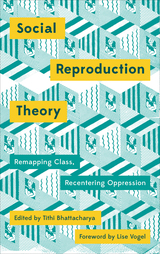2 books by Bhattacharya, Tithi

Ghostly Past, Capitalist Presence
A Social History of Fear in Colonial Bengal
Tithi Bhattacharya
Duke University Press, 2024
In Ghostly Past, Capitalist Presence, Tithi Bhattacharya maps the role that Bengali ghosts and ghost stories played in constituting the modern Indian nation, and the religious ideas seeded therein, as it emerged in dialogue with European science. Bhattacharya introduces readers to the multifarious habits and personalities of Bengal’s traditional ghosts and investigates and mourns their eventual extermination. For Bhattacharya, British colonization marked a transition from the older, multifaith folk world of traditional ghosts to newer and more frightening specters. These ‘modern’ Bengali ghosts, borne out of a new Rationality, were homogenous specters amenable to ‘scientific’ speculation and invoked at séance sessions in elite drawing rooms. Reading literature alongside the colonial archive, she uncovers a new reordering of science and faith from the middle of the nineteenth century. Bhattacharya argues that these shifts cemented the authority of a rising upper caste colonial elite who expelled the older ghosts in order to recast Hinduism as the conscience of the Indian nation. In so doing, Bhattacharya reveals how capitalism necessarily reshaped Bengal as part of the global colonial project.
[more]

Social Reproduction Theory
Remapping Class, Recentring Oppression
Edited by Tithi Bhattacharya
Pluto Press, 2017
“A marvelous new collection.”—Los Angeles Review of Books
“Every socialist needs to read it now.”—Socialist Action
Social Reproduction Theory is probably the first book to draw on the recent resurgent interest in developing a coherent Marxist-Feminist understanding of everyday life under capitalism. The ten essays here address a range of questions, with each contributor tackling the thorny problem of explaining just what social reproduction theory is. Though they do not always agree, each wrestles with the new and old questions that continue to be raised by feminists and theorists.
Readers new to the issues will learn much from the variety of points of view offered here. Those who have lived through previous women’s liberation debates will find novel answer to old questions and examples that illustrate new points and previous points of view.
Crystallizing the essential principles of social reproductive theory, this anthology provides long-overdue analysis of everyday life under capitalism. It focuses on issues such as childcare, healthcare, education, family life, and the roles of gender, race, and sexuality—all of which are central to understanding the relationship between exploitation and social oppression. Chapters include:
*Introduction: Mapping Social Reproduction Theory by Tithi Bhattacharya
*Crisis of Care? On the Social-Reproductive Contradictions of Contemporary Capitalism by Nancy Fraser
*Without Reserves by Salar Mohandesi and Emma Teitelman
*How Not to Skip Class: Social Reproduction of Labor and the Global Working Class by Tithi Bhattacharya
* Children, Childhood and Capitalism: A Social Reproduction Perspective by Susan Ferguson
*Mostly Work, Little Play: Social Reproduction, Migration, and Paid Domestic Work Montreal by Carmen Teeple Hopkins
*Pensions and Social Reproduction by Serap Saritas Oran
*Body Politics: The Social Reproduction by Alan Sears
rom Social Reproduction Feminism to the Women's Strike by Cinzia Arruzza
Tithi Bhattacharya brings together some of the leading writers and theorists, including Lise Vogel, Nancy Fraser, and Susan Ferguson, in order for us to better understand social relations and how to improve them in the fight against structural oppression.
“Every socialist needs to read it now.”—Socialist Action
Social Reproduction Theory is probably the first book to draw on the recent resurgent interest in developing a coherent Marxist-Feminist understanding of everyday life under capitalism. The ten essays here address a range of questions, with each contributor tackling the thorny problem of explaining just what social reproduction theory is. Though they do not always agree, each wrestles with the new and old questions that continue to be raised by feminists and theorists.
Readers new to the issues will learn much from the variety of points of view offered here. Those who have lived through previous women’s liberation debates will find novel answer to old questions and examples that illustrate new points and previous points of view.
Crystallizing the essential principles of social reproductive theory, this anthology provides long-overdue analysis of everyday life under capitalism. It focuses on issues such as childcare, healthcare, education, family life, and the roles of gender, race, and sexuality—all of which are central to understanding the relationship between exploitation and social oppression. Chapters include:
*Introduction: Mapping Social Reproduction Theory by Tithi Bhattacharya
*Crisis of Care? On the Social-Reproductive Contradictions of Contemporary Capitalism by Nancy Fraser
*Without Reserves by Salar Mohandesi and Emma Teitelman
*How Not to Skip Class: Social Reproduction of Labor and the Global Working Class by Tithi Bhattacharya
* Children, Childhood and Capitalism: A Social Reproduction Perspective by Susan Ferguson
*Mostly Work, Little Play: Social Reproduction, Migration, and Paid Domestic Work Montreal by Carmen Teeple Hopkins
*Pensions and Social Reproduction by Serap Saritas Oran
*Body Politics: The Social Reproduction by Alan Sears
rom Social Reproduction Feminism to the Women's Strike by Cinzia Arruzza
Tithi Bhattacharya brings together some of the leading writers and theorists, including Lise Vogel, Nancy Fraser, and Susan Ferguson, in order for us to better understand social relations and how to improve them in the fight against structural oppression.
[more]
READERS
Browse our collection.
PUBLISHERS
See BiblioVault's publisher services.
STUDENT SERVICES
Files for college accessibility offices.
UChicago Accessibility Resources
home | accessibility | search | about | contact us
BiblioVault ® 2001 - 2024
The University of Chicago Press









